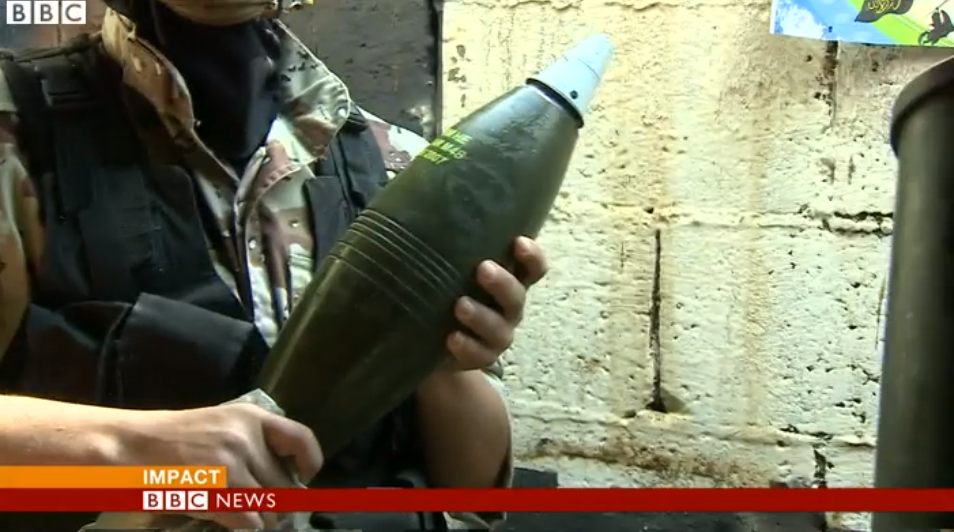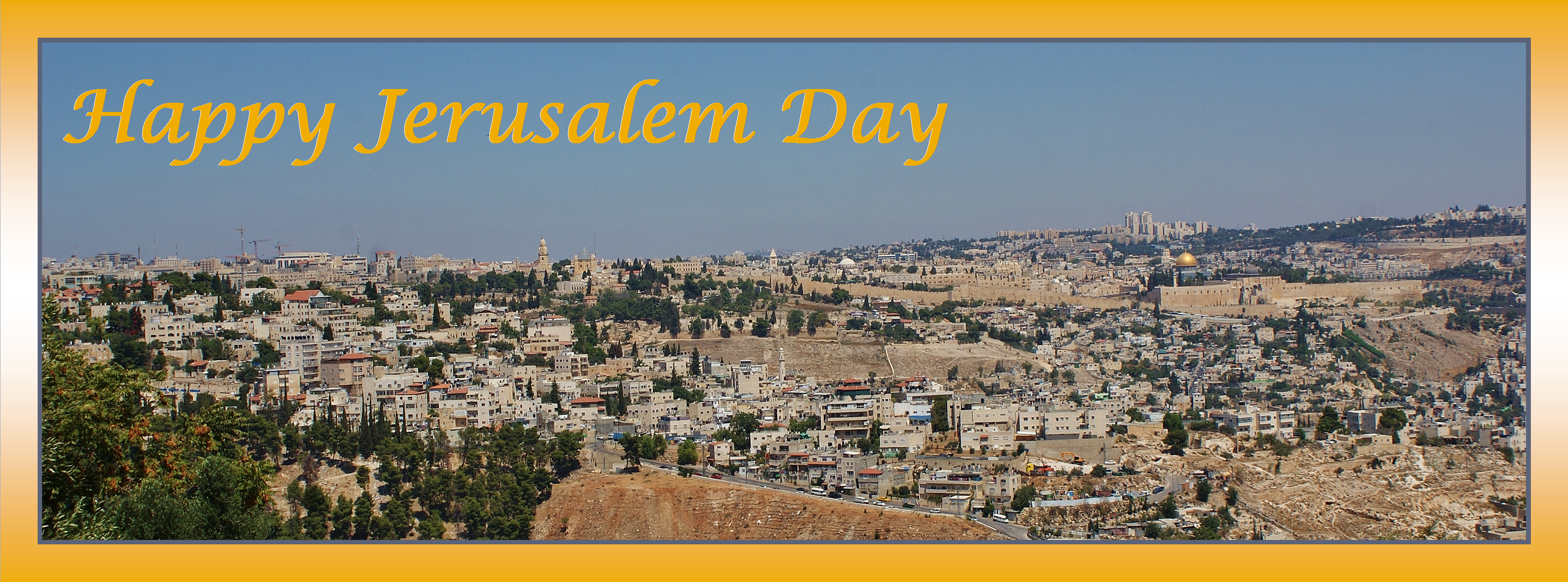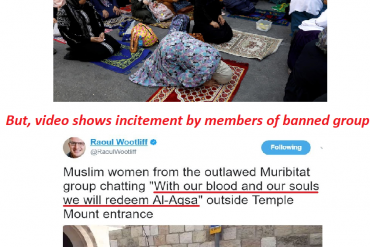On February 26th the BBC’s Jerusalem Bureau’s Quentin Sommerville produced two reports – one written and one filmed – about the Palestinian Islamic Jihad in the Gaza Strip.
The filmed report – first shown on the BBC News television programme ‘Impact’ – appeared on the BBC News website’s Middle East page under the title “Palestinian Islamic Jihad have rearmed and replenished ranks“. Sommerville opens the report with the same message as that appearing in the title:
“The threat of war is looming again in Gaza. These are the men of Palestinian Islamic Jihad. Six months since their last battle, they’ve rearmed and replenished their ranks in expectation of their next confrontation with Israel.”
Notably, BBC audiences are not informed at this juncture or at any other point in this report (or in the written article) how the PIJ has been able to rearm or who has supplied those weapons.
Of course the likelihood of any future confrontation between terrorist groups in the Gaza Strip and Israel depends entirely upon the policies chosen by the former: for as long as they elect to refrain from attacking Israeli civilians, there will be no “next confrontation”. Sommerville, however, allows one of his masked interviewees to mislead viewers with the inference that Israel is the party initiating the recurrent bouts of conflict.
“We are prepared for any aggression on the Gaza Strip.”
A short way into the report Sommerville tells audiences:
“….right by its [Israel’s] border…120 mm mortars. There’s an ample supply and there’s more inside.”
However, he refrains from commenting on the fact that the mortar marked ‘M48’ displayed by the PIJ terrorist he and his crew filmed bears a remarkable resemblance to the Iranian-made 120mm mortars intercepted by the IDF in 2009 aboard the ‘Francop‘ and of course he makes no effort to inquire where and how his hosts obtained their “ample supply”.
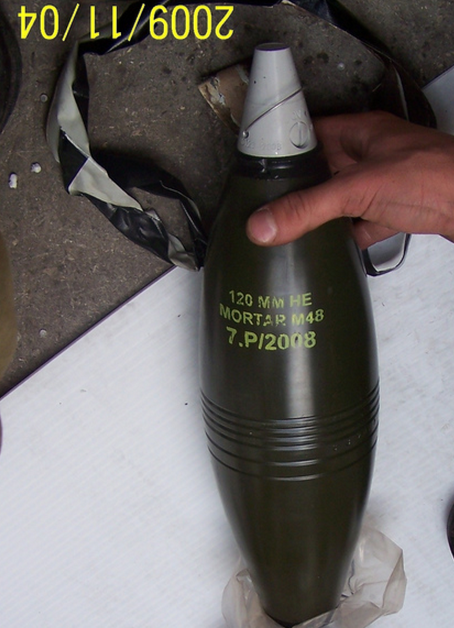
Later on in the report viewers are shown an image of what Sommerville describes as:
“The aftermath of an explosion on Gaza’s western border …”
The Gaza Strip’s western border is of course the Mediterranean coastline. Apparently just as geographically challenged as his colleague who recently described the Golan Heights as being west of Haifa, Sommerville is actually referring to the southern border of the Gaza Strip – as can be determined from the commentary which follows.
“Egyptian soldiers are piling on the pressure. They’re tightening the border and wiping out smuggling tunnels that have been a lifeline to Gaza. Egypt blames militants from here for aiding attacks in the Sinai.”
No effort is made to explain to viewers why Egypt makes such statements.
Throughout this report the PIJ are predictably referred to as “militants” and Sommerville informs viewers that:
“They [the PIJ] and Hamas are regarded by the West as terrorists.”
Of course there are also non-Western countries which take the same approach – now including Egypt.
In the closing interview with a masked terrorist, viewers are told that the ‘achievement’ of the PIJ during last summer’s conflict was:
“…we challenged the occupier […] we are still able to say no to the occupation.”
Sommerville fails to inform BBC audiences of the fact that the Gaza Strip has not been occupied by Israel since August 2005.
In the written version of his report – appearing in the Features & Analysis section of the BBC News website’s Middle East page under the headline “Inside Gaza’s tunnels, militants get ready for the next war” – Sommerville promotes some of the same themes.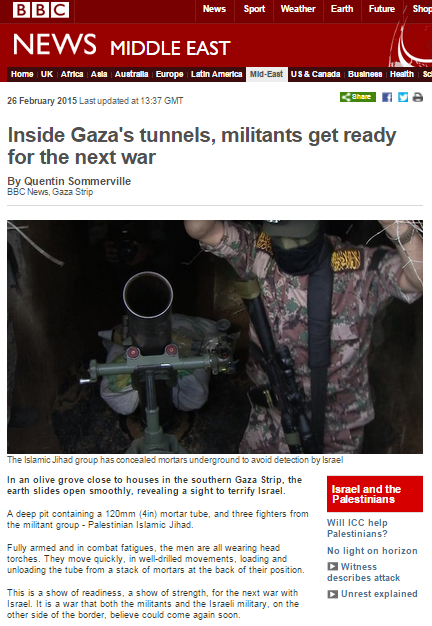
“Viewed as a terrorist group in the West, Islamic Jihad is committed to Israel’s destruction.”
And:
“Egypt’s soldiers move around in armoured vehicles. Border controls have been tightened and they are using explosives to destroy homes and smuggling tunnels that have been a lifeline to Gaza.
Egyptian President Abdul Fattah al-Sisi blames Hamas and others for aiding attacks in the Sinai.”
He again makes no effort to correct the inaccurate impressions received by readers from statements made by his interviewees.
“Standing inside, his face hidden, is a fighter, with the nom de guerre, Abu Hamza.
“In the last war we noticed that every moving thing on the surface of the earth was bombed, whether it was ambulances, civilians or fighters walking on the street,” he said. [emphasis added]
And:
“Our biggest achievement is that we stood our ground, and we challenged the occupier,” said Abu Ibrahim, a commander of their Saraya al-Quds brigade.
“Unlike the whole world, we are still able to say ‘no’ to them, ‘no’ to the occupation. We are still able to resist.” [emphasis added]
Sommerville continues the practice of promoting casualty figures which have not been independently verified by the BBC.
“The 50-day conflict in Gaza left at least 2,189 Palestinians dead, including more than 1,486 civilians, according to the UN, and 11,000 injured.”
His emotive descriptions of the Gaza Strip lack context and no effort is made to clarify to readers that the factor most hindering reconstruction in the Gaza Strip is infighting between Hamas and the Palestinian Authority.
“Large parts of neighbourhoods in Gaza are in ruins, and the Strip is in the midst of a humanitarian crisis which has left many thousands of families homeless.
Six months on, the rubble from the war lies mostly uncleared and there has been little rebuilding.” […]
“Gaza is being cornered, more isolated than ever before…”
Sommerville’s take-away message in both these reports is that the “next confrontation” between Israel and terrorist organisations in the Gaza Strip is just a matter of time. Whilst that supposition is entirely reasonable, he fails to present BBC audiences with the information they need in order to be able to properly understand why that is the case.
The fact that he refrains from accurately defining the Palestinian Islamic Jihad and Hamas as terrorist organisations, along with his overall failure to clarify to BBC audiences that any future hostilities depend entirely upon the choices made by those groups and his concurrent promotion of myths such as the non-existent “occupation”, means that readers and viewers remain none the wiser about the real causes of the war around the corner.
In addition, Sommerville’s avoidance of the issue of the PIJ’s Iranian backing and the sources of its rearmament mean that a crucial piece of the overall picture is concealed from BBC audiences and hence, what could have been informative journalism is instead disappointingly predictable and superficial, tapping into the same themes recycled by the BBC so many times before.

